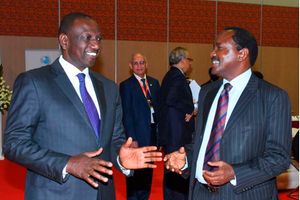Premium
Niger stages historic elections despite jihadist attacks

PDNS supporters waves flags of the Nigerien Party for Democracy and Socialism (PDNS) presidential candidate Mohamed Bazoum at the Diffa airport, upon Bazoum's arrrival for a presidential campaign rally on December 23, 2020.
Voters in the Sahel state of Niger go to the polls on Sunday for an election that could seal the country's first-ever peaceful handover between elected presidents, despite a bloody jihadist insurgency.
The West African country has been chronically unstable since gaining independence from France 60 years ago, and is ranked the world's poorest country according to the UN's Human Development Index.
Around 7.4 million people are registered to vote for the ballot for presidency, which coincides with legislative elections.
President Mahamadou Issoufou, who was elected in 2011 after the country's last coup in 2010, is voluntarily stepping down after two five-year terms.
The frontrunner in the 30-strong field is his designated successor, Mohamed Bazoum, 60, a former interior and foreign minister.
Other prominent hopefuls are two former heads of state, Mahamane Ousmane, 70, and Salou Djibo, 55.
Bazoum's main rival, former prime minister Hama Amadou, 70, was last month barred from contesting the vote on the grounds that in 2017 he was handed a 12-month term for alleged baby trafficking -- a charge he says was bogus.
Campaigning has been overshadowed by the issue of security. Niger is being battered by jihadists on two fronts -- on its southwestern border with Mali, and its southeastern frontier with Nigeria.
Four thousand people in Burkina Faso, Mali and Niger died last year from jihadist violence and ethnic bloodshed stirred by Islamists, according to the UN.
In Niger itself, hundreds have died in the past five years, and hundreds of thousands have fled their homes.
The economy, already fragile, has suffered devastating blows. Around 42 per cent of the population lived last year on under $1.90 (1.56 euros) per day, according to the World Bank, while nearly a fifth of its surging population of 23 million relied on food aid.
On Monday, seven troops and 11 suspected jihadists died in an ambush in the southwestern region of Tillaberi, the government said on Thursday.
On December 12, 34 villagers were massacred in Toumour, in the southeastern region of Diffa, on the eve of municipal and regional elections that had been repeatedly delayed because of poor security.
The army has been massively deployed for Sunday's vote, the authorities say.
"Sporadic attacks will not prevent the stage of the elections," a spokesman said on Thursday. The attack in Toumour triggered a three-day period of national mourning, but the elections the following day went ahead smoothly, officials say.





